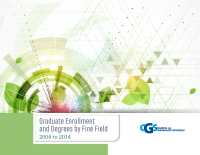You are on CGS' Legacy Site.
Thank you for visiting CGS! You are currently using CGS' legacy site, which is no longer supported. For up-to-date information, including publications purchasing and meeting information, please visit cgsnet.org.

Graduate Enrollment and Degrees by Fine Field: 2004 to 2014
Member Price:
$0.00
Non Member price:
$0.00
Wednesday, September 30, 2015
1
102 Pages
This report, available only to CGS member institutions, includes data tables on Fall 2014 first-time and total graduate enrollment data by fine field of study (e.g., chemistry, history, philosophy, etc.), gender, citizenship, and race/ethnicity and graduate degrees awarded in Academic Year 2013-14 by fine field of study, degree level (master's vs. doctoral), and gender. The tables also include one-year percent changes, as well as five-year and ten-year average annual percent changes.
Available in the following formats
Free
CGS is the leading source of information, data analysis, and trends in graduate education. Our benchmarking data help member institutions to assess performance in key areas, make informed decisions, and develop plans that are suited to their goals.
CGS Best Practice initiatives address common challenges in graduate education by supporting institutional innovations and sharing effective practices with the graduate community. Our programs have provided millions of dollars of support for improvement and innovation projects at member institutions.
As the national voice for graduate education, CGS serves as a resource on issues regarding graduate education, research, and scholarship. CGS collaborates with other national stakeholders to advance the graduate education community in the policy and advocacy arenas.
CGS is an authority on global trends in graduate education and a leader in the international graduate community. Our resources and meetings on global issues help members internationalize their campuses, develop sustainable collaborations, and prepare their students for a global future.





